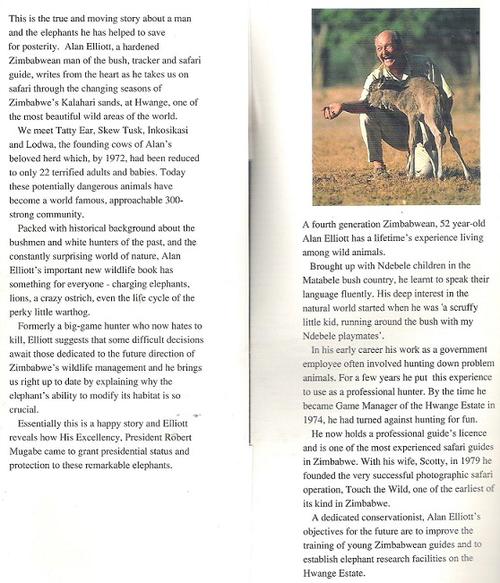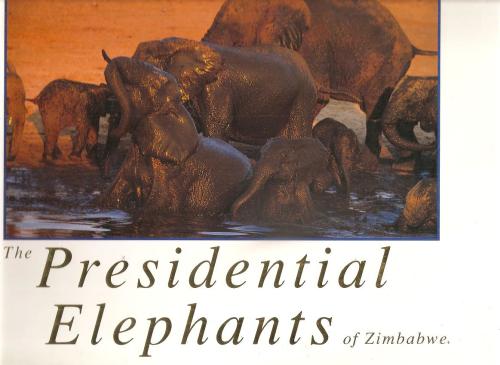Alan Elliot
Father of the Presidential Elephants, Zimbabwe
Alan Elliot
Pioneer | Protector | Conservationist
After Zimbabwean independence in 1980, Alan Elliott pioneered the first safari-circuit of lodges across the country, calling the safari company Touch the Wild. It all started on the Hwange Estate bordering Hwange National Park.
But Alan is best remembered as the father of The Presidential Elephants of Zimbabwe (and for his strong views on wildlife conservation, and elephant conservation in particular).From his base on the Hwange Estate Alan Elliot devoted over 20 years to saving a particular herd of elephants (more on the story below). During that time the herd grew from a handful of frightened individuals to a healthy group of over 300. Concerned for their future, Alan approached President Mugabe to grant protection and they are now known as ‘The Presidential Elephants’.
“Just look at those elephants,” he whispered. “People ask why I want to save them – they should come out here and see for themselves.” Alan Elliot
ABOUT THE PRESEDENTIAL ELEPHANTS
In the 1970`s hunting (& widespread illegal poaching) had left just 22 elephants at Hwange estate which comprises 140 square km of unfenced land; a mixture of State, Forestry & privately owned land, bordering Hwange National Park Main Camp.
The closest settlement to Hwange estate is the small rural railway township of Dete, 4km from which you’ll find Miombo Safari Camp. Given they & their family members had been virtually wiped out by hunters, the few remaining elephants naturally had become extremely skittish, acutely focused & wary of any human presence. In the two interceding decades between 1970 & 1990, Alan Elliott who at that time owned the safari company called ´Touch the Wild` made a concerted effort to win over the remaining elephant’s confidence & gradually, he was able to habituate them to human presence, thus sparking a wonderful & unique tourism draw card. Success in habituating these elephants did however come with an unexpected downside as by 1990, they had become so friendly Elliott realized that in itself put them in danger, so he lobbied President Mugabe’s office for the herd to be granted special status. Zimbabwe’s Presidential Elephant herd was indeed anointed when President Robert Mugabe in that same year decreed these habituated elephants that roam the Hwange estate should never be hunted or culled; rather that they should ¨symbolize Zimbabwe’s commitment to responsible wildlife management¨. Hence, as a result of this decree & under the patronage of the President of Zimbabwe, they became known as ‘The Presidential Elephants of Zimbabwe’- a flagship herd.Courtesy: Sharon Pincottt and National Geographic
Go back to: Pioneers & early conservationists
AN UPDATE FROM SHARON STEAD - SEPT 2016
In 1974, an enthusiastic conservationist, Alan Elliott, started working with the Presidential Elephants. He had succeeded Johnny Uys, who had been killed by an elephant, as Game Manager of the Hwange Estate and areas surrounding Hwange Safari Lodge.
Initially, there were 22 nervous elephants, night-drinking ghosts fleeing the relentless persecution of bygone years. This area had been used as a hunting training ground for National Parks recruits and other hunters. This is the same area where the celebrated hunter, Selous, had nearly met his end over 100 years ago. All this stopped with the development of the Hwange Estate. Slowly, with protection and careful management, the herd increased, still wary, still suspicious of human activity, but every day learning that vehicles and chatter did not bring wounding and death. This population prospered over the next 15 years and became known for their increasingly passive nature and tolerance of visitors in game-drive vehicle as a result the protection offered by Elliott and his dedicated team. By the late 80s it had become policy within National Parks to conduct large-scale population reduction exercises known as culling. Then, in 1990, Elliott, concerned about the possibility of the Estate Elephants getting caught in the crossfire when venturing into the park approached the President requesting his patronage and special protection of this unusual herd. The President agreed to this unique proposal and from that time these became known as the Presidential Elephants of Zimbabwe. Even as far back as the 70s, some elephants were victims of accidental snaring by poachers who set their snares for buffalo and other animals as a source of meat. Although not large-scale this continues to this day and some hunting of elephants in the Presidential Elephant home range now takes place. Fortunately anti-poaching patrols take place and the Painted Dog research team are particularly effective. The Presidential Elephants continue to prosper and an increasingly high percentage of calves can be observed. No doubt there has been some immigration of elephants on to the Estate from the National Park. Some might argue that the number of approximately 500 elephants may be too high but this seemingly is contradicted by their high reproduction rate....Allan Elliott is still in Hwange and proactive in heading up the Presidential Elephant Trust. His finger is firmly on the pulse and, together with key stakeholders in the photographic safari industry, has vowed to continue to protect this national treasure. The Presidential Elephants are a good news story; come and experience them and their environment.Courtesy: Zimbabwe’s Presidential Elephants – a good news story by Sharon Stead.
PUBLICATIONS
The Presidential Elephants of Zimbabwe by Alan Elliot - ISBN 0797410031, published 1991.

